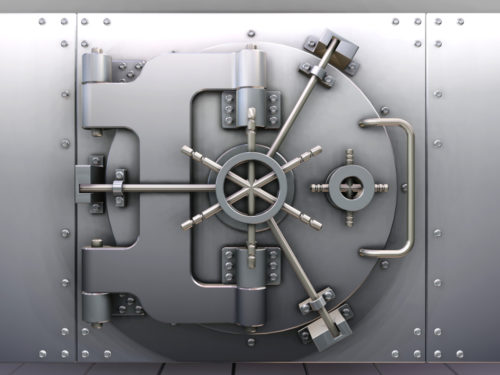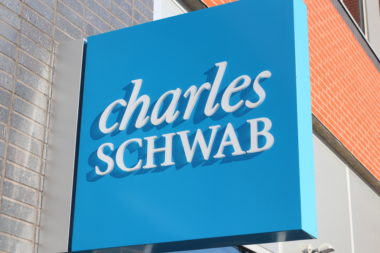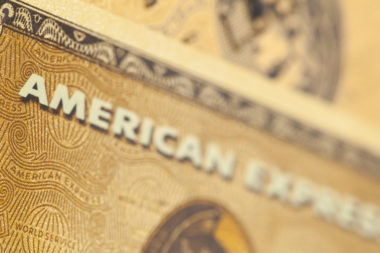Some individuals have concerns about trusting a bank with their hard-earned money. A 2017 survey by the Federal Deposit Insurance Corporation (FDIC) found that roughly 8 million American households did not have a checking or savings account. The same survey found that 30.2% of those households did not have a bank account because they did not trust banks with their money.
A skeptic of the banking system could point to the fact that Capital One was recently compromised and credit scores, credit limits, and account balances may have been exposed. If you’re asking yourself, “How safe is my money in the bank?” read on to learn more.
Table of Contents
Are Banks a Safe Place to Keep Money?
If you have any doubts about keeping your money in a U.S. bank, rest assured. Banks are the safest place to keep your money. The federal government backs banks — and the money you keep there — through certain programs.
Keeping your money hidden at home poses a far greater risk of losing it than keeping it in the bank. There are no reports of consumers losing money entrusted to a bank, but the FBI estimates that there were over 1.4 million burglaries in the U.S. in 2017. Keeping your money under your mattress is much riskier than depositing it in a checking or savings account.
How Much Money Is Safe in a Bank?
Although banks are safe, keeping large amounts of money in a single bank account is not advisable. It’s better to avoid putting all your eggs in one basket. Here is how your money is protected if a financial institution fails.
The FDIC is a government agency appointed to oversee banks and guarantee customer deposits. They insure your money up to $250,000 per individual, per insured bank, for each type of bank account.
If the insured financial institution collapses, fails, or suffers a cyber attack, you would be fully reimbursed for money lost, up to the $250,000 limit. FDIC insurance protects all deposit accounts such as:
If you have $150,000 plus earned interest in a savings account, the funds are insured. But what happens if you have $310,000 in a certificate of deposit (CD)? Only $250,000 would be reimbursed if the bank fails.
In this scenario, it’s best to spread your money around to other banks or account types. You can deposit $60,000 into a savings account or a money market, for example, and make sure your certificate of deposit isn’t higher than the $250,000 limit.
It would be advisable to keep a little less than the maximum in the CD because the FDIC also covers the interest your money earns. If you top out your CD at $250,000 and your account grows to $254,000 because of interest earnings, $4,000 is lost in a bank failure.
What Money Do Government Bank Guarantees Not Cover?
Some types of financial products aren’t protected by FDIC insurance. They’re usually investments that come with some risk, such as stocks, bonds, mutual funds, life insurance policies, annuities, or securities.
What Happens if My Bank Fails?
Bank failures happen more often than you think. In 2019 alone, four insured banks shut down. Luckily, no customers lost their money, thanks to the FDIC. Backed by the U.S. Treasury, the FDIC replaces the funds as quickly as 24 hours. The process is normally so fast that individuals don’t realize what happened until they realize their bank changed names.
Why Banks Are So Safe
There are several factors that make banks a safe place to put your money. If you stay within the protection limits, events such as a fire, security breach, or an armed bank heist are the bank’s problem — not yours. Here’s a closer look at all the factors that make banks so safe.
Government Bank Guarantees
The federal government financially backs most banks through the FDIC. Your money is insured up to $250,000 per individual, per insured bank, for each type of bank account. Credit unions are backed by similar protections through the National Union Share Insurance Fund and are just as safe.
One of the most reassuring reasons banks are safe is because “the full faith and credit of the United States Government stands behind the Federal Deposit Insurance Corporation.”
Government Regulation
Besides backing banks financially, government agencies also keep a close eye on banks to stop them from behaving recklessly with consumer deposits. The Consumer Financial Protection Bureau (CFPB) oversees federal financial laws relating to banks, lending, and credit cards in order to protect consumers.
Consumer Confidence
It’s not just the government breathing down banks’ necks — banks also have to answer to consumers who may close their accounts and switch to a competitor or a credit union. Banks need your business to make money and competition encourages them to behave responsibly while offering competitive rates.
Bank Risks
Just like any scenario, there are risks associated. Some risks are out of a person’s control, such as systemic, operational, market, or liquidity risks where all banks are affected by an economic crisis, for example. All banks have dedicated risk-management departments that monitor and manage their exposure to risk that may affect the public’s money — and their trust in banks.
The government has a stake in making sure the public’s money is safe. Government regulation and guarantees from the FDIC are part of the steps taken to prevent major failures. The Federal Reserve Bank also works to prepare for any scenario which could affect the economy. They regularly conduct and report stress tests to evaluate how a bank copes with economic trouble.
Finding a Secure Bank
To choose the most secure bank possible, confirm if the bank you’re considering is FDIC insured. When in doubt, refer to the FDIC bank finder to confirm.
You can also research bank and credit union reviews and ratings to make an informed decision. BauerFinancial rates bank using a simple star system, with a five-star award for the safest banks. You can search banks by area or by entering its name to read how they fared in the rating.
Alternatives to Banks
The best option for safeguarding your money is by putting it in the bank. However, some individuals may not be able to open a bank account. There are several great alternatives to traditional banks, some which can also earn you a higher interest rate. Some alternative options to traditional banks include:
- Municipal bonds: Your investment is secure and tax exempt;
- Prepaid debit cards: Similar to a debit card with many checking account perks, but doesn’t require a bank account;
- High-yield online savings accounts: You’ll earn a higher interest rate and enjoy many of the same banking perks through mobile banking;
- U.S. Treasury securities: They’re the safest of all investments because they’re issued by the U.S. government;
- High-yield bonds: Issued by corporations with long terms of 20 years or more.
Image Source: https://depositphotos.com/





